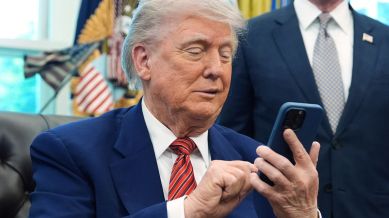Government shutdown: The latest five developments from Washington
President Donald Trump said the funding lapse was an “opportunity” to cut back government, while Democrats pressed for permanent healthcare tax credits.

The United States government shutdown entered its third day on Friday with no sign of progress. President Donald Trump said the funding lapse was an “opportunity” to cut back government, while Democrats pressed for permanent healthcare tax credits.
Here’s what you need to know
monthly limit of free stories.
with an Express account.
- Talks stall in the Senate
Negotiations in the Senate have failed to end the deadlock. Republicans want to pass a short-term funding bill to reopen government offices, but Democrats insist on guarantees that tax credits for health care will continue under the Affordable Care Act.
Senate Majority Leader John Thune said Democrats were repeatedly voting “no” and would have the weekend to reconsider.
- Trump freezes billions in projects
Trump has supported White House budget director Russ Vought in pausing major infrastructure spending. That includes $2.1 billion for Chicago’s Red Line train extension and $18 billion for rail projects in New York.
The administration said it was reviewing whether race-based or unconstitutional practices were involved, but Democrats argue the moves are politically motivated.
- Federal workers face furloughs
The Congressional Budget Office estimates that about 750,000 federal workers could be furloughed, losing roughly $400 million in wages every day until a funding deal is reached.
These workers, who include staff in agencies handling transport, environment and health, will not be paid during the shutdown unless Congress later approves back pay.
- Democrats demand healthcare relief
Democrats say their main goal is to protect families from higher medical costs. House Democratic leader Hakeem Jeffries told AP that without an extension of the credits, more than 20 million Americans will face higher insurance premiums and co-payments.
Senator Amy Klobuchar said Republicans were “not working with us” to find a compromise that avoids both a shutdown and rising health costs.
- Fears of wider economic impact
Economists warn the shutdown could harm the economy if it drags on. Treasury Secretary Scott Bessent said prolonged furloughs could slow consumer spending, while transit researchers told AP that delays to infrastructure projects would make them more expensive in the long run.
Senator Chuck Schumer, the Democratic leader, said freezing funds for rail projects would hurt commuters and weaken growth.